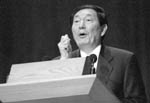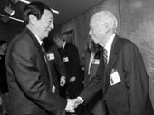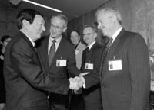Chinese Premier Zhu Rongji declared in a speech at MIT that the US-China trade imbalance was neither as large nor as detrimental to America as popularly believed, and urged the US to export more of the high-technology products that China needs.
Premier Zhu, who spoke in Chinese with simultaneous translation in Kresge Auditorium on April 14, visited MIT at the end of a nine-day, six-city US visit that included trade negotiations and discussions between Chinese and US government officials. More than 4,000 demonstrators -- many protesting China's stances on human-rights, Taiwan and Tibet, and others with welcoming signs -- chanted and waved banners on the sidewalks of Massachusetts Avenue near Kresge.
In introducing Premier Zhu, President Charles M. Vest noted that he and many others had grown up during the Cold War, when collaboration between the US and China ceased.
"I believe that those of us in the American and Chinese academic communities have a special responsibility to foster interaction and communication and better understanding. We must educate each other and we must learn from each other. Today is an historic opportunity to do just that," Dr. Vest said.
Premier Zhu began his talk by declaring that the US-China trade deficit numbers "have been greatly exaggerated." While the US claims the figure stands at $56.9 billion and China says it is $21.1 billion, Premier Zhu said that work of Lawrence Lau, professor of economics at Stanford, shows that both figures are inaccurate. The actual deficit is about $30 billion, he said.
Whatever the amount, Premier Zhu said, "Don't make such a big deal out of this trade deficit." The total trade gap for the United States last year was more than $200 billion, which is only about 2 percent of the gross domestic product. "This [proportion] is very common in many countries," including Canada, he said.
'MAJOR CONCESSIONS'
As part of negotiations aimed at winning membership in the World Trade Organization, China has made "very major concessions," Premier Zhu said. Although China will "do its best" to reduce the imbalance, Premier Zhu said, he asserted that the deficit "is not only in China's interest, but also to a large extent in America's interest."
China's exports to the US are "mostly labor-intensive consumer goods with little value added," he said. "You've stopped producing them long ago, so this sort of import has absolutely no competition in the US."
Importing rather than manufacturing these products "is good for the readjustment of your economic structure; it allows you to develop your high-tech industries," Premier Zhu said. If the United States imported the same goods from a country other than China, it would have to pay about $20 billion more per year for them, which could worsen inflation here, he said.
More than 70 percent of Chinese exports to the United States are products sold by companies started by foreign investors, including Americans, Premier Zhu said. China mostly assembles raw materials from Asian countries and then exports the finished goods, he said, so many Chinese exports to the US "represent a transfer of exports to the US by these other countries and regions." Thus, while the US has increased its trade deficit with China, it has cut its deficit with other countries, "so your total trade deficit is constant," he said.
Referring to the recent outcry over allegations that a Chinese-born scientist may have stolen nuclear secrets from a US weapons lab and passed them to China, Premier Zhu quipped that when MIT President Charles M. Vest was discussing astronomy and the secrets of the universe with him, "I was so afraid of the word 'secret' because it reminded me of espionage."
ADVOCATING FREE TRADE
Nevertheless, the United States should relax restrictions on exporting technology to China, Premier Zhu said. "First and foremost, the US should really do what it advocates -- that's free trade," he said. If the US shows more willingness to transfer technologies to China, then "several years from now, you'll have a very big market worth hundreds of billions of dollars."
China recently sought to acquire a US-made computer and launch a satellite but was prevented from doing so by technology trade restrictions, Premier Zhu said. "How can we improve the trade balance under such circumstances? The US only wants to export wheat and citrus fruit."
The American government and people should not base their attitudes on a fear of the world's most populous country, Premier Zhu said. "What kind of threat can China pose to the US?" he asked. While the United States has about 6,000 nuclear weapons, China has only 20 to 30, he said. Also, "the Chinese per-capita gross domestic product is dozens of times smaller. Even in 30 to 50 years, there still will be a big gap. China will be your partner, not your adversary."
Premier Zhu expressed the hope that Chinese-US cooperation would continue to grow, continuing the strides made by leaders of both countries over the last 30 years. "It is very important to establish a constructive strategic partnership between our countries," he said. The current difficulties in Chinese-US relations "are no more than a small digression in friendly relations... The cloud is going to pass and the sun will shine brightly, so let us work together for that."
In a question-and-answer period following his speech, Premier Zhu was asked by an audience member when China would cease its "dictatorial role" and release dissident Xu Wenli, a democracy campaigner sentenced to 13 years in prison last December.
"Human rights in China are improving from one day to the next, and I think it's fair to say that the degree of human rights now being enjoyed by the Chinese people is unprecedented in China's history," said Premier Zhu, who would not discuss the specific case of Xu Wenli. "We acknowledge that we still have shortcomings, and these shortcomings are ones which we are still working hard to address;" the National People's Congress is now working on revising the constitution to make China a country that is "ruled in accordance with law," he said.
BOOSTING SCIENCE AND TECHNOLOGY
Speaking on behalf of alumni of Tsinghua University (where Premier Zhu received his degree in electrical engineering and where he is still dean of its business school), another audience member asked what problems China is encountering in its efforts to invigorate itself though science and education, and what it is doing to encourage Chinese students studying abroad to return to work. (MIT's Sloan School of Management has educational initiatives with Tsinghua as well as Fudan University and the Lingnan [University] College of Zhongshan University.)
The Premier answered that science and education is indeed a high priority, "and the investment we've put into this effort in the last two years is unprecedented in scope and size." One of China's greatest needs, he added, is management and accounting expertise.
"China is very short of talented managers," he said. "That's why I was saying to President Vest a little earlier that what we would like to see more than anything else is to see MIT helping us to trainthese high-level managerial persons." He made an appeal for any accounting or securities experts to come work in China: "I promise I will pay you what you are paid here," he said in English to audience laughter.
GENDER BIAS QUESTION
Professor Mary Potter of brain and cognitive sciences -- one of several who gathered information about gender bias against MIT women science faculty members -- asked Premier Zhu what China was doing to ensure the full use of the talents of women and girls.
"I'm very much in favor of equality for men and women, though China traditionally has a history of putting men over women," the Premier replied. "We have many organizations whose mission is to protect and defend the interests of women and children." He noted that one of the Chinese government officials on the Kresge stage with him was Madame Wu Yi, a state councilor who was heavily involved in the WTO talks.
"In this round of negotiations, she was the premier and I was the vice premier," he quipped.
A version of this article appeared in the April 21, 1999 issue of MIT Tech Talk (Volume 43, Number 27).








